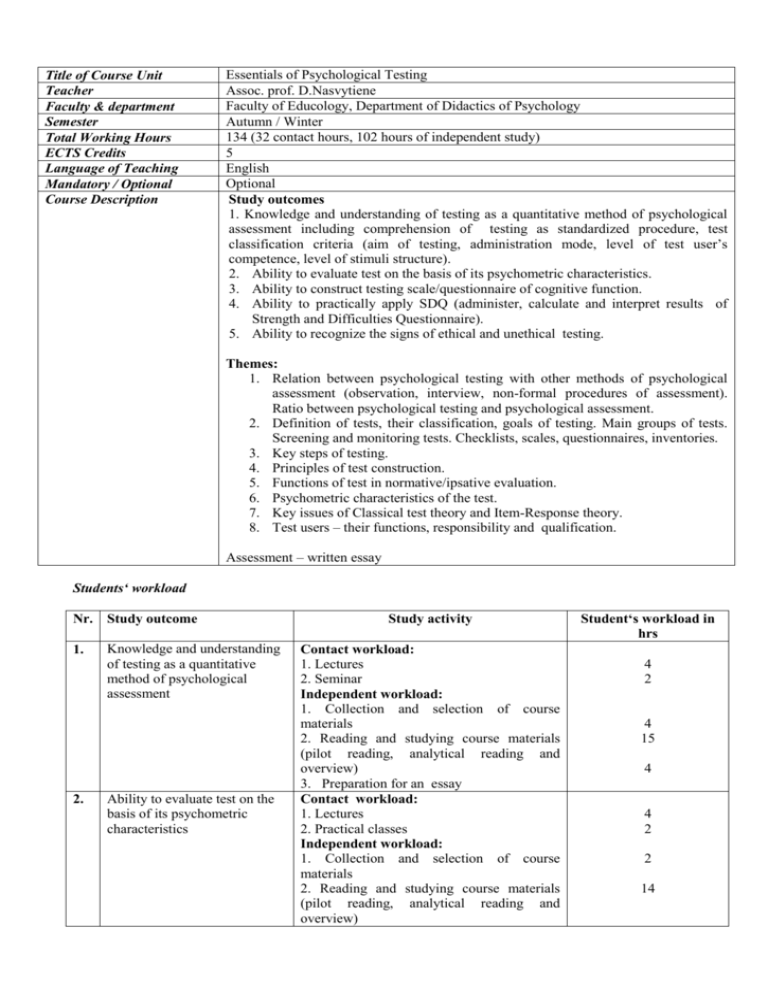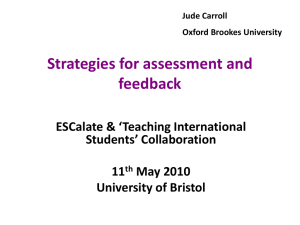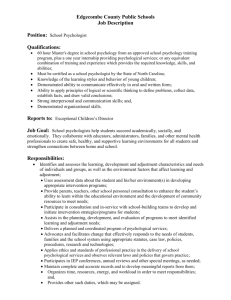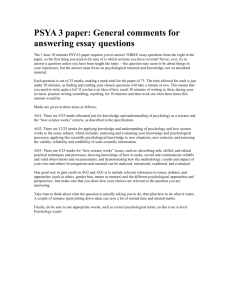Essentials of Psychological Testing
advertisement

Title of Course Unit Teacher Faculty & department Semester Total Working Hours ECTS Credits Language of Teaching Mandatory / Optional Course Description Essentials of Psychological Testing Assoc. prof. D.Nasvytiene Faculty of Educology, Department of Didactics of Psychology Autumn / Winter 134 (32 contact hours, 102 hours of independent study) 5 English Optional Study outcomes 1. Knowledge and understanding of testing as a quantitative method of psychological assessment including comprehension of testing as standardized procedure, test classification criteria (aim of testing, administration mode, level of test user’s competence, level of stimuli structure). 2. Ability to evaluate test on the basis of its psychometric characteristics. 3. Ability to construct testing scale/questionnaire of cognitive function. 4. Ability to practically apply SDQ (administer, calculate and interpret results of Strength and Difficulties Questionnaire). 5. Ability to recognize the signs of ethical and unethical testing. Themes: 1. Relation between psychological testing with other methods of psychological assessment (observation, interview, non-formal procedures of assessment). Ratio between psychological testing and psychological assessment. 2. Definition of tests, their classification, goals of testing. Main groups of tests. Screening and monitoring tests. Checklists, scales, questionnaires, inventories. 3. Key steps of testing. 4. Principles of test construction. 5. Functions of test in normative/ipsative evaluation. 6. Psychometric characteristics of the test. 7. Key issues of Classical test theory and Item-Response theory. 8. Test users – their functions, responsibility and qualification. Assessment – written essay Students‘ workload Nr. Study outcome 1. 2. Knowledge and understanding of testing as a quantitative method of psychological assessment Ability to evaluate test on the basis of its psychometric characteristics Study activity Contact workload: 1. Lectures 2. Seminar Independent workload: 1. Collection and selection of course materials 2. Reading and studying course materials (pilot reading, analytical reading and overview) 3. Preparation for an essay Contact workload: 1. Lectures 2. Practical classes Independent workload: 1. Collection and selection of course materials 2. Reading and studying course materials (pilot reading, analytical reading and overview) Student‘s workload in hrs 4 2 4 15 4 4 2 2 14 3. 4. 5. Ability to construct testing scale/questionnaire of cognitive function Ability to practically apply SDQ Ability to recognize the signs of ethical and unethical testing 3. Preparation for presentation 4. Preparation for an essay Contact workload: 1. Consultation with teachers 2. Practical classes Independent workload: 1. Collection and selection of course materials 2. Reading and studying course materials 3. Process of construction 3. Reflection of construction as preparation for an essay Contact workload: 1. Lectures 2. Practical classes Independent workload: 1. Collection and selection of course materials 2. Reading and studying course materials 3. Data collection and interpretation 3. Preparation for a report presentation 4. Preparation for an essay Contact workload: 1. Lecture 2. Practical classes Independent workload: 1. Preparation for a discussion 2. Consultation with teacher 3. Preparation for an essay 4 2 4 4 4 4 15 2 4 4 2 4 8 2 2 2 2 8 2 4 Readings: 1. Kline Th. (2005). Psychological testing. Thousand Oaks: London – New Delhi. D10014 in VPU Laboratory of Psychology. 2. Urbina S. Essentials of psychological testing. Wiley & Sons, 2004. Ur – 06 in in VPU Laboratory of Psychology. 3. Aiken L. Psychological Testing and Assessment. Boston-New York: Allyn & Bacon, 2003. 159.9 Ai35 in VPU Laboratory of Psychology. 4. Gillham B. Developing a Questionnaire. New York:Continuum, 2005. 5. Reynolds C., Kamphaus R. Handbook of Psychological and educational Assessment of Children. New York-London: The Guilford Press, 2003. Ha-234 in VPU Laboratory of Psychology. 6. Sattler J. Testing children. Section III in: Assessment of Children. Cognitive Applications, p. 183220. San diego: Author, 2001.






![Guidelines for Academic Workload Allocation[1]](http://s3.studylib.net/store/data/007357775_1-c08378375a61bf04d5de327b7ce434b5-300x300.png)
